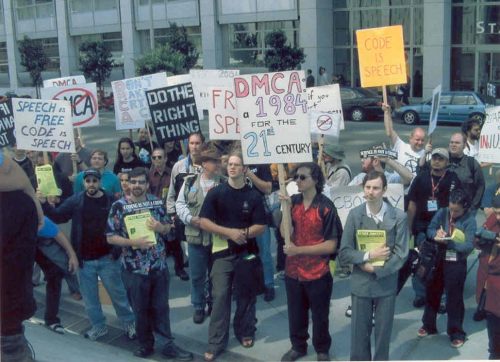April 29, 2009
Category: Uncategorized — Biella @ 8:36 pm
Today I found out that some of my students refer to me as “Enid,” a name which has rarely been used to call my attention but now circulates almost daily to my students whenever I post a message on Blackboard. It was a little mortifying to find out as I don’t identify much with Enid, though it has always tagged quietly along with my other names.
BB, which we use for readings, our discussion forum,and email messages, spits out my legal (tax) name, which bears the full Enid Gabriella Coleman. Although I have tried, somewhat persistently, I have failed to change it to the E. Gabriella Coleman that I would rather use. While I find it hard to embrace Enid as I just don’t feel like an Enid, at least yet (and may break it out when I write fiction or when I turn 65), I have always liked having the name Enid in so far as it pays homage to my Aunt Enid whose life ended far too early, soon before I was born and from all accounts, she was one stellar woman.
My parents chose to tack it on for commemorative purposes, intending to call me Gabriella after some Italian cabaret singer my mother loved. The plan, however, was immediately foiled by my older sister who apparently blurted out something like “Biella” when she saw the scraggly “rat-like baby” (as my mom used to describe me) that was christened her younger sister.
Biella, like Gabriella, also has Italian roots: it is a beautiful town in Italty and a less than beautiful but so-ugly-it-is-kinda-cute Italian Pug.
Perhaps the lesson in all of this is to tell students about my name and finally ditch BB, which is the software equivalent to Soviet style communist housing, and move over to another platform.
Category: Uncategorized — Biella @ 7:52 pm
Today I found out that some of my students refer to me as “Enid,” a name which has rarely been used to call my attention but now circulates almost daily to my students whenever I post a message on Blackboard. It was a little mortifying to find out as I don’t identify much with Enid, though it has always tagged quietly along with my other names.
BB, which we use for readings, our discussion forum,and email messages, spits out my legal (tax) name, which bears the full Enid Gabriella Coleman. Although I have tried, somewhat persistently, I have failed to change it to the E. Gabriella Coleman that I would rather use. While I find it hard to embrace Enid as I just don’t feel like an Enid, at least yet (and may break it out when I write fiction or when I turn 65), I have always liked having the name Enid in so far as it pays homage to my Aunt Enid whose life ended far too early, soon before I was born and from all accounts, she was one stellar woman.
My parents chose to tack it on for commemorative purposes, intending to call me Gabriella after some Italian cabaret singer my mother loved. The plan, however, was immediately foiled by my older sister who apparently blurted out something like “Biella” when she saw the scraggly “rat-like baby” (as my mom used to describe me) that was christened her younger sister.
Biella, like Gabriella, also has Italian roots: it is a beautiful town in Italty and a less than beautiful but so-ugly-it-is-kinda-cute Italian Pug.
Perhaps the lesson in all of this is to tell students about my name and finally ditch BB, which is the software equivalent to Soviet style communist housing, and move over to another platform.
April 28, 2009
Category: Uncategorized — Biella @ 7:42 pm
Call for papers:
JITP-2010
“The Politics of Open Source”
May 6-7, 2010 – Amherst, Massachusetts
Full Paper Submission Due Date: January 10, 2010
Approach
Free/Libre and Open Source Software (FOSS) has made significant advances, both technically and organizationally, since its emergence in the mid-1980s. Over the last decade, it has moved from a software development approach involving mostly volunteers to a more complex ecology where firms, nonprofit organizations, government agencies and volunteers may be involved. Moreover, the production paradigm continues to expand to other areas of digital content (e.g., Creative Commons, Wikipedia, Connexions, etc.). In this conference we use the phrase “open source” to capture this broader phenomenon. The Program Committee encourages disciplinary and interdisciplinary approaches to the study of open source, broadly defined.
“Politics” in the conference title, can have many interpretations. Political issues closely tied to the free and open source software movement(s) include: national government policies related to the adoption of open source technologies or questions related to interoperability and open standards, software patents, vendor lock-in, and copyright. These are central themes we expect may be discussed in this forum. In this context, we welcome international submissions since differences in the political perspective appear in international contexts. However, topics related to how the concept of openness has led to various interpretations, adaptations, and applications of “open source” in other domains, and political issues that surround these broader innovations, are also welcome. Specific topics might include, but are not limited to:
General topics related to the politics of open source:
+ How open source software or its principles are changing politics
+ Emerging transparencies in software, systems and society
+ Open source in the developing world and other international contexts
+ The political economy of open source
+ Digital divides and open source
Open source and the public sector:
+ Open source software and transparency in government
+ Government policies toward open source and open standards
+ Regulation and open source
Open source and democracy:
+ Open source and democratic engagement
+ Open source voting systems
+ Activism, political mobilization and open source
The expansion of open source into other domains:
+ Understanding how open source collaboration works and how it can be extended into other areas of collective action
+ Policy areas, such as the effects of free textbooks on education policy or the politics of “One Laptop Per Child”
+ The political implications of open source in other cultural domains
Keynote Speakers
We are pleased to confirm Eric von Hippel (MIT) and Clay Johnson (Sunlight Labs) as the daily keynote speakers for JITP-2010.
Paper Submissions
Authors are invited to prepare and submit to JITP a manuscript following one of the six submission formats by January 10, 2010. These formats include research papers, policy viewpoints, workbench notes, review essays, book reviews, and papers on teaching innovation. The goal is to produce a special issue, or double issue, of JITP with a wide variety of approaches to the broad theme of “The Politics of Open Source.”
(more…)
Category: Uncategorized — Biella @ 11:02 am
Here is a short clip on the topic.
Category: Uncategorized — Biella @ 10:16 am
So lately I have not had much luck getting open licenses for my articles (though I have for my book, which I will write about later) but SAGE is offering “Free Access” for the month of April. Alex “Rex” Golub and I have a piece, which is fairly jargony (in the academic sense) on three variants of hacking, which you can download here. The forthcoming articles are more accessible and I will drop a note when they are published.
April 27, 2009
Category: Uncategorized — Biella @ 2:53 pm
I know there are DD’s and other FLOSS folks in Madrid, so don’t miss Chris Kelty’s talk on Free Software and Open Biology on May 5th!
Category: Uncategorized — Biella @ 12:49 pm
April 26, 2009
Category: Uncategorized — Biella @ 5:09 am
Here are the Winter Camp interviews in Ogg format
April 25, 2009
Category: Uncategorized — Biella @ 7:43 pm
So for years and years and years I assumed this photo was taken by a good friend of mine (and we sill think it may be) but we can’t totally verify if it is his as he lost all his old photos after a server hack-in.
Do you recognize this photo? Do you have photos from this Free Dmitry protest (August 2008, in front of the San Francisco Prosecutors office) that would share for an academic publication on this topic???
Help!
Category: Uncategorized — Biella @ 6:45 am
So, when I like something, I tend to yap about it for weeks and weeks. Take Icelandic Yogurt, for example. After re-discovering it a month ago, I went on a mini-binge (not a mega as it is too expensive) and spread the word to anyone who would listen. The stuff, especially with fun flavors like ginger and orange, just made my morning.
Another fine fine thing out there is the performance group What We Know So Far who give performance-based lectures that mix intellectual insight with artistic flair. They put us regular academics to shame who are a bit more staid, to put it mildly. After seeing them a few weeks ago at the 3rd Ward, I snagged them to give a version of their A-mazing talk on Memes in my class and am organizing a much larger event at NYU for the fall of 2009.
This is a sort of long winded way of announcing their up and coming show on April 27th the Hannah Complex, which entertains, among other topics, the nature of common sense: “Can there be more than one common sense?” they ask on their site.
And I can’t wait to hear the answer as this is a recurrent topic that anthropologists like to entertain. And in fact one of my favorite essays to teach is on this topic, Clifford Geertz “Common Sense as Cultural System,” a short excerpt which I found here and below is his thesis in a nutshell:
There are a number of reasons why treating common sense as a relatively organized body of considered thought, rather than just what anyone clothed and in his right mind knows, should lead on to some useful conclusions; but perhaps the most important is that it is an inherent characteristic of common-sense thought precisely to deny this and to affirm that its tenets are immediate deliverances of experience, not deliberated reflections upon it. Knowing that rain wets and that one ought to come in out of it, or that fire burns and one ought not to play with it (to stick to our own culture for the moment) are conflated into comprising one large realm of the given and undeniable, a catalog of in-the-grain-of-nature realities so peremptory as to force themselves upon any mind sufficiently unclouded to receive them. Yet this is clearly not so. No one, or no one functioning very well, doubts that rain wets; but there may be some people around who question the proposition that one ought to come in out of it, holding that it is good for one’s character to brave the elements—hatlessness is next to godliness. And the attractions of playing with fire often, with some people usually, override the full recognition of the pain that will result. Religion rests its case on revelation, science on method, ideology on moral passion; but common sense rests its on the assertion that it is not a case at all, just life in a nutshell. The world is its authority.
”




